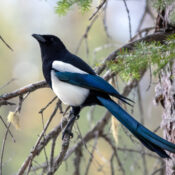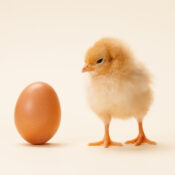Early in 1928, Time announced its editors had chosen Charles Lindbergh as its very first Man of the Year (for 1927). It became an annual tradition there (with the title changing to Person of the Year for 1999), but the idea caught on with other publications, too. Now, at the end of every year, readers look forward the announcement of, for example, National Geographic’s Pictures of the Year, Sports Illustrated’s Sportsperson of the Year, and even Guns & Ammo’s Handgun of the Year.
Dictionaries have gotten in on the fun, too. Since words are their stock in trade, they naturally choose Words of the Year (WOTY), and each publication has its own process and criteria. Here are the 2024 Words of the Year from six English language dictionaries and the criteria they use to determine the winner.
Merriam-Webster Dictionaries (American): polarization
Merriam-Webster — keepers of the dictionary that the Post relies on — chooses its WOTY based on the words people look up most in its online dictionary. Their WOTY isn’t based solely on volume, though; because, common words like love and marriage are routinely the most looked-up terms, they also look at the size of the change in the number of lookups.
For 2024, Merriam-Webster’s Word of the Year is polarization, “division into two sharply distinct opposites; especially, a state in which the opinions, beliefs, or interests of a group or society no longer range along a continuum but become concentrated at opposing extremes.” They note that “[s]earch volume [for polarization] on Merriam-Webster.com throughout the year reflected the desire of Americans to better understand the complex state of affairs in our country and around the world.”
Dictionary.com (American): demure
To choose its WOTY, the lexicographers at Dictionary.com look at more data than just their own website data and explore “newsworthy headlines, trends on social media, search engine results, and more to identify words that made an impact on our conversations.” Their choice of demure reflects a meteoric rise in the use of the word beginning in mid-2024. From January to August, the word “saw a nearly 1200% increase in usage in digital web media alone. This sharp rise is mainly attributed to TikToker Jools Lebron’s popularization of the phrase ‘very demure, very mindful’ in a series of videos posted to the platform in early August.”
Though demure traditionally means “characterized by shyness and modesty; reserved,” it is seeing a growing sense to describe “refined and sophisticated appearance or behavior in various contexts, such as at work or on a plane.”
Oxford University Press (British): brain rot
The Oxford University Press — publishers of the Oxford English Dictionary — compiled a shortlist of six finalists and then held a public poll in which more than 37,000 participated. After the votes were counted, brain rot — defined as “the supposed deterioration of a person’s mental or intellectual state, especially viewed as the result of overconsumption of material (now particularly online content) considered to be trivial or unchallenging” — was declared the winner. The logophiles at Oxford “noticed that brain rot gained new prominence this year as a term used to capture concerns about the impact of consuming excessive amounts of low-quality online content, especially on social media.” They estimate it increased in frequency of use by 230 percent.
Though the word seems thoroughly modern, the OED folks point out that its first known use in print was in Henry David Thoreau’s Walden, way back in 1854.
“But wait,” you might be saying, “brain rot is two words, not one!” That’s true, from a certain perspective. Word might be defined in part as a string of letters with no intervening spaces or punctuation, but in order for lexicographers to create truly useful dictionaries, they need to look at not only words but at semantic units — that is, groupings of words that hold a unique meaning. For example, if you look up the meaning of ice and the meaning of cream, that doesn’t give you enough information to understand what ice cream is; ice cream therefore merits its own dictionary entry and is considered a “word” to lexicographers. Same goes for make-believe, or living will, or toilet water.
And besides, “Semantic Unit of the Year” doesn’t have quite the same ring.
Cambridge Dictionary (British): manifest
Cambridge uses a system similar to Merriam-Webster, focusing on lookups in its online dictionary. Whether their winning word, manifest¸ is an indication that people who use the Cambridge Dictionary are generally more optimistic than those who use these other dictionaries is unclear. Regardless, the verb manifest — “to use methods such as visualization and affirmation to help you imagine achieving something you want, in the belief that doing so will make it more likely to happen” — was looked up almost 130,000 times last year, making it one of the most viewed words on the Cambridge Dictionary website.
According to Cambridge, one factor that raised the prestige of the word was that “the word manifest jumped from being mainly used in the self-help community and on social media to being mentioned widely across mainstream media.”
Manifest has an interesting history of change, tracing back to the Latin manifestus — “plainly apparent” or, of offenses, “proved by direct evidence” — from the word manus “hand.”
Collins Dictionaries (British): brat
The Collins Dictionaries WOTY is chosen by an internal team of editors, lexicographers, marketers, and publicity staff in their Glasgow and London offices.
The noun brat in the sense of “an unwanted or unplanned child” has been around since the early 1500s, with its senses becoming more generalized over the centuries. But the word found new vibrance starting last June after pop singer Charli XCX released her sixth and (so far) most critically acclaimed album, Brat. Several weeks later, after the announcement that Kamala Harris would be the Democratic presidential candidate, Charli XCX tweeted “kamala IS brat,” and then the word really took off.
Since then, according to David Shariatmadari, brat “has clearly captured something of the spirit of the age.” The former noun is finding new use in adjectival senses, which Collins defines as “characterized by a confident, independent, and hedonistic attitude.” Since this is such a new sense, it remains to be seen whether it has any staying power.
Macquarie Dictionary (Australian): enshittification
Each year, Macquarie calls together a select committee to discuss the words and definitions that were added to its dictionary over the previous year (making its choice more accurately New Word of the Year). The committee compiles a shortlist, which is then voted on by the committee members and also by the public at large. This year, the committee and the people agreed that the Macquarie Dictionary Word of the Year is enshittification.
The word may have been coined but certainly was popularized by author Cory Doctorow in 2023. He used the term to describe how digital platforms take a similar path to becoming worse and worse: “Here is how platforms die: first, they are good to their users; then they abuse their users to make things better for their business customers; finally, they abuse those business customers to claw back all the value for themselves. Then, they die.”
It should be noted that enshittification was previously chosen as 2023 Word of the Year last January at the annual convention of the American Dialect Society.
Become a Saturday Evening Post member and enjoy unlimited access. Subscribe now




Comments
I’m surprised ‘conflate’ did not make the list, since we’ve been hearing it all over podcasts this year.
I really don’t like any of these ‘words of the year’, but do like your feature otherwise, of course. I’ve heard ‘polarization’ a lot, so I get that. ‘Brain rot’ also’ doing my best to filter it out in this asinine day and age. I mentioned ‘demure’ in the current 12/20 ‘News of the Week’ column as something more from the 19th (and early 20th) in the era of parlors, courting and gentleman callers.
Although the ‘new’ meaning is positive, it is different and therefore inaccurate in this new context. It may be a passing fad, or not. We (educated people anyway) know that the word ‘gay’ USED TO mean happy, fun, light etc., and was used in ad copy to mean just that before falling out of favor.
For decades its been obsolete in that sense at all anymore, which is kind of too bad, because the word itself does sound like an accurate description of something in that original sense. In closing however, I’m surprised ‘unburdened’ wasn’t in there for this slowly going away year.